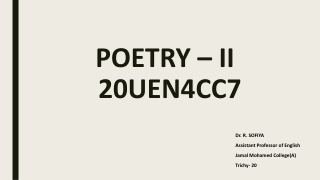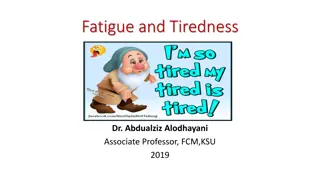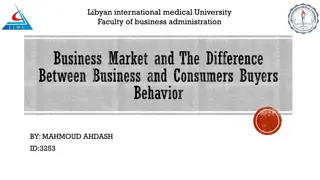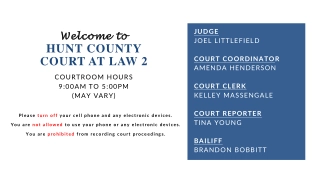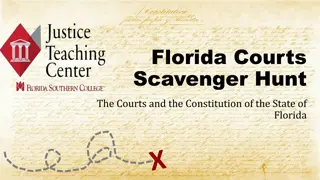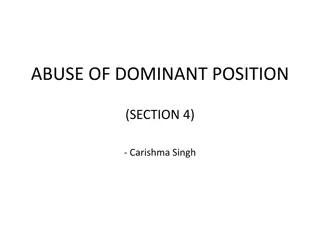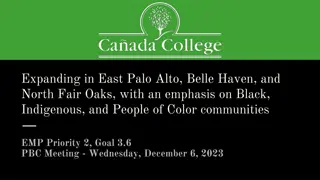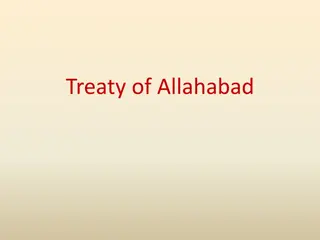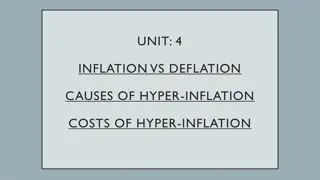Witch Hunts in East Anglia: Causes and Motives Behind the Witch Hunt Led by Hopkins and Stearne
Witch hunts in East Anglia between 1645 and 1647 were influenced by a combination of economic and political factors. The disastrous agricultural conditions of the mid-1640s, high taxation, poverty, and political turmoil contributed to the witch hysteria. Accusations were primarily driven by tensions in rural communities, where villagers blamed witches for misfortunes. The local administration's focus on the war effort also hindered efforts to address witchcraft accusations early on.
Download Presentation
Please find below an Image/Link to download the presentation.
The content on the website is provided AS IS for your information and personal use only. It may not be sold, licensed, or shared on other websites without obtaining consent from the author. Download presentation by click this link. If you encounter any issues during the download, it is possible that the publisher has removed the file from their server.
Presentation Transcript
www.hoddereducation.co.uk/modernhistoryreview The East Anglia witch hunts The causes of the witch hunts and the motives of Hopkins and Stearne
Witch hunts in England Probably no more than 500 witches executed in England between 1500 and 1700. This was much less than in continental Europe The only mass hunt was in East Anglia between 1645 and 1647. It was led by Matthew Hopkins and John Stearne Witchcraft in England was an endemic, rather than an epidemic problem, where witch trials were sporadic and few, and where the acquittal rate was high (James Sharpe 2002)
Witch hunts in England Largely rural most people lived in the countryside Most trials were the result of accusations by neighbours. This suggests that rural communities were not harmonious. Troublemakers in villages were punished using the ducking stool usually offenders were seen as scolds , defined as a troublesome and angry woman who, by her brawling and wrangling amongst her neighbours, doth break the public peace and beget, cherish and increase public discord . Close association between scolds and witchcraft
Causes of the East Anglian witch hunts: economic The mid 1640s were a disastrous time for farmers. Wet summers combined with freezing winters led to regular crop failures. In 1646 the summer was exceptionally wet, with disease affecting livestock and crops [ ] In an air of such confusion and misery it was easy to blame witches for people s misfortune. Bullock, O. (2016) The Witch Craze in Britain, Europe and North America c1580-c1750
Causes of the East Anglian witch hunts: economic There were high levels of taxation Inflation had resulted in poverty Crop failure in the 1640s, wet summers and cold winters Changing land use, enclosure and rich acquired more land Easy at a time of crisis to spread rumours of witchcraft and blame those on the edge of society and the village
Causes of the East Anglian witch hunts: political Local administration was concerned with keeping the war effort going. Local justices of the peace who might otherwise have helped diffuse witchcraft accusations at an early stage were preoccupied. Sharpe, J. (2019) Witchcraft in Early Modern England By early 1645 the eastern counties of England were in a state of crisis. The outcome of the Civil War was far from certain. It seemed possible that royalist forces might advance into East Anglia. Farmer, A. (2016)The Witchcraze of the 16th and 17th Centuries
Causes of the East Anglian witch hunts: political There had been a breakdown in local authority (the local judicial system) Reaction against decline of prosecutions under Charles I Assize system had broken down as too dangerous for judges to leave London, magistrates had less experience Authority of local gentry undermined by war Collapse of central authority due to war Civil War created a tense atmosphere and people looked for individuals to blame, witches were an ideal scapegoat
Causes of the East Anglian witch hunts: The English Civil Wars The outcome of the war in 1645 was uncertain Fears Royalist army might advance into East Anglia Civil War had led to high levels of taxation
Causes of the East Anglian witch hunts: religious The sense that victory on the battlefield depended on godliness at home made hunting witches feel like part of the war effort. Gaskill, M. (2005) Witchfinders: A Seventeenth-century English Tragedy
Causes of the East Anglian witch hunts: religious Most places where prosecutions took place were noted for godly enthusiasm Most of the villages had seen the destruction of church images in 1643 44 There had been a shift towards hard-line Puritanism and a purge of clergy thought not to be reliable Witch-hunting and persecution of Catholics were linked Desire among Puritans to create a godly commonwealth Route followed that of the Iconoclast General , William Dowsing East Anglia was a Puritan stronghold
Motives of Hopkins and Stearne: greed The usual explanation for the prosecutions is that they were stirred up by Hopkins and Stearne. The usual motive ascribed to them is greed. They were certainly paid for their witch-hunting, but the suggestion that they started looking for witches because they were impoverished appears to have no factual basis. Macfarlane, A. (1978) Witchcraft in Tudor and Stuart England
Motives of Hopkins and Stearne: greed Ipswich had to raise a special tax to pay for them in 1645 Aldeburgh witch-hunt cost 1/7 of its annual expenses Hopkins fee at Aldeburgh was 8 Had the potential to earn more in a week than most did in a year
Motives of Hopkins and Stearne: religion Although it is easy to imagine he was sly and sarcastic, there is no reason to think him insincere in his convictions: a Calvinist belief in his own predestined salvation, and a loathing of witchcraft and idolatry as cancers at the heart of Christian society. Gaskill, M. (2005) Witchfinders: A Seventeenth Century English Tragedy Hopkins was the younger son of a Puritan clergyman Hopkins was a devout Puritan so would see this as part of the battle between good and evil
Motives of Hopkins and Stearne: public duty The real spur to their activity, at least in Essex, seems to have been a combination of curiosity, bewilderment, and anxiety, with a desire to exercise power and perform a useful public duty. Macfarlane, A. (1978) Witchcraft in Tudor and Stuart England There was considerable concern in East Anglia about witches They only went to towns to which they were invited
Motives of Hopkins and Stearne: personal fear Though Hopkins claims to have been, with Sterane, in personal danger, the impression that this was in the background: more striking was their feeling of surprise, mingles with horror, at the conspiracy which they had discovered. Macfarlane, A. (1978) Witchcraft in Tudor and Stuart England, 1978 Hopkins was concerned by noises he heard outside his bedroom and had caught snatches of conversations between the Manningtree witches
Were the East Anglian Witch hunts driven from above or below? Driven from above: The only English prosecutions which were obviously stimulated from above, in the continental manner, were the work of professional witch-finder Matthew Hopkins, and his associate John Stearne. Thomas, K. (1978) Religion and the Decline of Magic It was Hopkins experience in Manningtree that led to his involvement Hopkins and Stearne were supported by the local magistrate Harbottle Grimston
Were the East Anglian Witch hunts driven from above or below? Driven from below: All the time Hopkins and Stearne were building on pre-existing and localised tensions and could not have succeeded without wider support from below [ ] The pressure for the trials could not have been exerted by a small group of witch-finders; they were distributed more widely Macfarlane, A. (1970) Witchcraft in Tudor and Stuart England They were invited to numerous parishes They went only to towns where they were welcome It was for searchers and watchers appointed by the parish to decide whether there were grounds for prosecution




